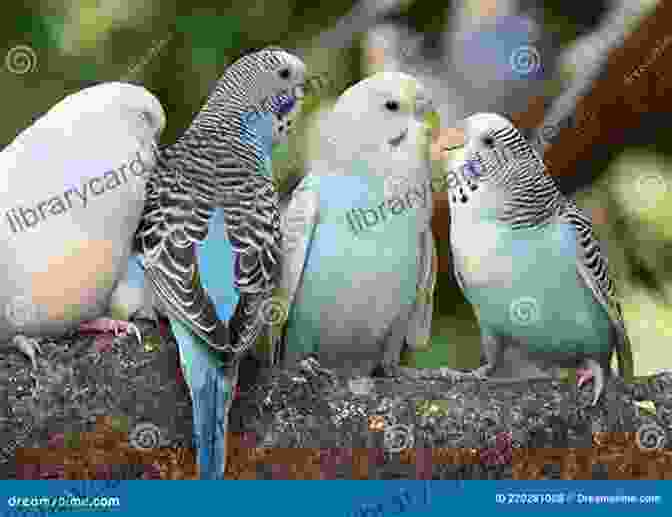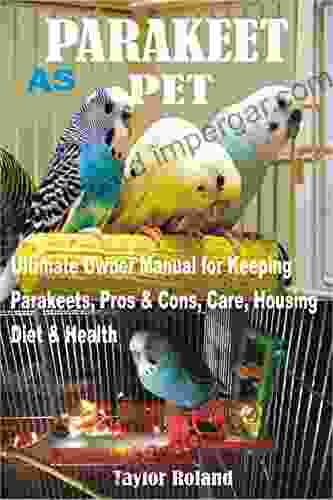The Ultimate Owner Manual for Keeping Parakeets: Pros, Cons, Care, Housing, Diet, and More


4.8 out of 5
| Language | : | English |
| File size | : | 27267 KB |
| Text-to-Speech | : | Enabled |
| Screen Reader | : | Supported |
| Enhanced typesetting | : | Enabled |
| Print length | : | 89 pages |
| Lending | : | Enabled |
Parakeets, also known as budgies, are popular companion birds due to their vibrant colors, playful personalities, and relatively low-maintenance care. However, before bringing a parakeet into your home, it's important to understand their unique needs and challenges. This comprehensive owner manual will provide you with everything you need to know about keeping parakeets, from their pros and cons to their care, housing, diet, and health.
Pros of Keeping Parakeets
- Affectionate and social: Parakeets are social birds that bond strongly with their owners. They enjoy interacting with humans and can even learn to talk and sing.
- Relatively low-maintenance: Compared to other pet birds, parakeets require less maintenance and care. They are relatively independent and can be left alone for short periods of time.
- Small and easy to handle: Parakeets are small birds that are easy to handle and transport. This makes them suitable for people with limited space or who travel frequently.
- Can live for up to 10 years: With proper care, parakeets can live for up to 10 years, providing you with years of companionship.
Cons of Keeping Parakeets
- Can be noisy: Parakeets are known for their loud and frequent chirping. This can be a nuisance if you live in an apartment or have sensitive neighbors.
- Prone to health problems: Parakeets are susceptible to a number of health issues, including respiratory problems, feather plucking, and obesity.
- Require attention and socialization: While parakeets can be left alone for short periods, they require regular attention and socialization. If they are neglected, they can become lonely and develop behavioral problems.
- Can be messy: Parakeets shed feathers and produce droppings, which can create a mess in their cage and around your home.
Care and Handling
Parakeets require proper care and handling to ensure their health and well-being. Here are some essential tips:
- Provide a spacious cage: Parakeets need a cage that is large enough for them to move around comfortably and spread their wings. The cage should be equipped with perches, toys, and a nest box.
- Offer a healthy diet: Parakeets should be fed a balanced diet that includes seeds, pellets, fruits, and vegetables. Avoid feeding them sugary or fatty foods.
- Provide fresh water daily: Parakeets need access to fresh water at all times. Change their water daily and clean their water dish regularly.
- Maintain a clean environment: Parakeets need a clean cage and environment to stay healthy. Clean their cage weekly and remove any droppings or debris.
- Handle with care: Parakeets are delicate birds and should be handled with care. Support their body and head when picking them up.
Housing
Choosing the right cage for your parakeet is essential for their well-being. Here are some factors to consider:
- Size: The cage should be large enough for your parakeet to move around comfortably and spread its wings. A good rule of thumb is to choose a cage that is at least 24 inches long, 18 inches wide, and 18 inches high.
- Shape: Rectangular cages are best for parakeets because they provide more space for them to fly and play. Avoid cages with round or dome-shaped roofs, as these can restrict their movement.
- Bar spacing: The bar spacing should be small enough to prevent your parakeet from escaping or getting its head stuck. The ideal bar spacing for parakeets is 1/2 inch or less.
- Doors and windows: The cage should have multiple doors and windows for easy access and ventilation. The doors should be large enough for you to reach in and clean the cage without disturbing your parakeet.
Diet
Parakeets are omnivores and their diet should include a variety of foods. Here are some essential nutrients that parakeets need:
- Seeds: Seeds should make up the bulk of your parakeet's diet. A good quality seed mix will contain a variety of seeds, such as millet, sunflower seeds, and canary seeds.
- Pellets: Pellets are a convenient and nutritious way to provide your parakeet with a balanced diet. They are made from a variety of ingredients, including grains, legumes, and vitamins.
- Fruits: Fruits are a good source of vitamins and antioxidants. Parakeets enjoy eating fruits such as apples, bananas, and oranges.
- Vegetables: Vegetables are also a good source of vitamins and minerals. Parakeets enjoy eating vegetables such as spinach, carrots, and broccoli.
Health
Parakeets are susceptible to a number of health problems, including:
- Respiratory problems: Respiratory problems are the most common health problem in parakeets. Symptoms include sneezing, coughing, and difficulty breathing.
- Feather plucking: Feather plucking is a common behavior problem in parakeets. It can be caused by a number of factors, including stress, boredom, and skin irritation.
- Obesity: Obesity is a common problem in parakeets that are fed a diet that is too high in fat and calories.
- Proventricular dilatation disease (PDD): PDD is a fatal disease that affects the digestive system of parakeets. Symptoms include vomiting, diarrhea, and weight loss.
Parakeets can make wonderful companion birds, but it's important to understand their unique needs and challenges before bringing one into your home. The Ultimate Owner Manual for Keeping Parakeets provides you with all the information you need to make an informed decision and provide your parakeet with a happy and healthy life.
Thank you for choosing to adopt a parakeet. With proper care and attention, your parakeet will provide you with years of companionship and enjoyment.
4.8 out of 5
| Language | : | English |
| File size | : | 27267 KB |
| Text-to-Speech | : | Enabled |
| Screen Reader | : | Supported |
| Enhanced typesetting | : | Enabled |
| Print length | : | 89 pages |
| Lending | : | Enabled |
Do you want to contribute by writing guest posts on this blog?
Please contact us and send us a resume of previous articles that you have written.
 Book
Book Novel
Novel Page
Page Chapter
Chapter Text
Text Story
Story Genre
Genre Reader
Reader Library
Library Paperback
Paperback E-book
E-book Magazine
Magazine Newspaper
Newspaper Paragraph
Paragraph Sentence
Sentence Bookmark
Bookmark Shelf
Shelf Glossary
Glossary Bibliography
Bibliography Foreword
Foreword Preface
Preface Synopsis
Synopsis Annotation
Annotation Footnote
Footnote Manuscript
Manuscript Scroll
Scroll Codex
Codex Tome
Tome Bestseller
Bestseller Classics
Classics Library card
Library card Narrative
Narrative Biography
Biography Autobiography
Autobiography Memoir
Memoir Reference
Reference Encyclopedia
Encyclopedia Alenka Klemenc
Alenka Klemenc Sharon D Anderson Phd
Sharon D Anderson Phd James R Lewis
James R Lewis Alexis Muston
Alexis Muston Amber Ault
Amber Ault Robert D Wallace
Robert D Wallace Amber Hunt
Amber Hunt Amandine Marshall
Amandine Marshall Alex Allen
Alex Allen Jordan Shapiro
Jordan Shapiro Jay M Smith
Jay M Smith Ron Westrum
Ron Westrum Alana Sharps
Alana Sharps Allan A Murray
Allan A Murray Alex Blanchette
Alex Blanchette Barnes Carr
Barnes Carr Lissa K Wadewitz
Lissa K Wadewitz Alison Bailey
Alison Bailey Amanda Rose
Amanda Rose Alex Rosenberg
Alex Rosenberg
Light bulbAdvertise smarter! Our strategic ad space ensures maximum exposure. Reserve your spot today!
 Martin CoxFollow ·19.5k
Martin CoxFollow ·19.5k Ernest J. GainesFollow ·12.6k
Ernest J. GainesFollow ·12.6k Jorge AmadoFollow ·14.2k
Jorge AmadoFollow ·14.2k Robert ReedFollow ·7.6k
Robert ReedFollow ·7.6k Nathan ReedFollow ·10.6k
Nathan ReedFollow ·10.6k Doug PriceFollow ·11k
Doug PriceFollow ·11k Fyodor DostoevskyFollow ·6.4k
Fyodor DostoevskyFollow ·6.4k Federico García LorcaFollow ·6.1k
Federico García LorcaFollow ·6.1k

 Ignacio Hayes
Ignacio HayesUnveiling the Secret Spitfires: Britain's Hidden Civilian...
: The Untold Story of Britain's...

 Scott Parker
Scott ParkerLiving With Schizophrenia: A Father and Son's Journey
Schizophrenia is a serious...

 Ted Simmons
Ted Simmons"From Sign Up to Pass Out": The Shocking and Immersive...
Step into the...

 John Keats
John KeatsThe Development of Biographies and Philosophical...
The Alluring...

 Dan Brown
Dan BrownCapture Your Dream Wedding with Digital Wedding...
Your wedding day is...
4.8 out of 5
| Language | : | English |
| File size | : | 27267 KB |
| Text-to-Speech | : | Enabled |
| Screen Reader | : | Supported |
| Enhanced typesetting | : | Enabled |
| Print length | : | 89 pages |
| Lending | : | Enabled |












